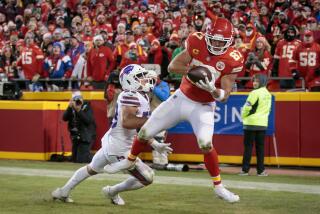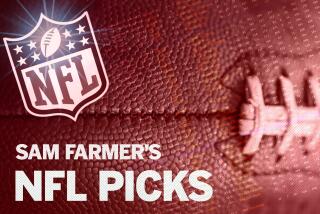NFL Ready to Turn On the Lights for Playoffs
- Share via
You can, as they say, take this to the bank: The NFL has put on its last daytime playoff game. From wild-card weekend through the Super Bowl, they’ll all be night games beginning next winter.
The owners of the 32 teams haven’t voted on that. It will be several months before they do. But they’re talking it up.
They were “surprised, impressed, and pleased,” sources say, by the artistic success of the blizzard game that started at 8 p.m. on a freezing Saturday night in a couple of weeks ago when the Patriots and Oakland Raiders gained a combined 595 yards in a continuous snowstorm, completing 49 passes for 450 yards.
As the snow kept tumbling down and piling up, the Patriots, rallying to win, 16-13, completed nine passes in a row in the fourth quarter and eight of eight in overtime.
A prime-time TV ratings hit, the game attracted many more millions of viewers than would have watched at noon.
Thus, the NFL’s owners, with television’s strong support, are thinking about kickoff times of 3:30 or 4 p.m.--instead of 12:30--and then 7:30 or 8 p.m. for all future playoff games, some perhaps on Monday night.
The two conference title games, always in the past played as a Sunday TV doubleheader, would be played on Saturday night and Sunday night.
*
The Complete Team
The St. Louis Rams have taken over this month as a complete football team, which is more than you can say for the Patriots, which surely means that in the Super Bowl, they’ll take the Patriots down.
As Marshall Faulk ran brilliantly for 159 yards, the Rams, to eliminate the Philadelphia Eagles last Sunday, 29-24, meshed the NFL’s best rushing game with the NFL’s best passing offense and another helping of clutch defense.
After New England led at the half, 17-13, the Rams ran from behind to win on Faulk’s 31 carries. Meantime, Kurt Warner completed 22 of 33 passes for 212 yards. And Aeneas Williams and Grant Wistrom made the game-saving defensive plays.
All things considered, of the great NFL teams over the many years, the Rams seemed the most complete.
By contrast, the Patriots, who could neither run nor pass consistently, eliminated the Pittsburgh Steelers, 24-17, with one platoon--their special teams--scoring two of their three touchdowns on kicking plays.
More exactly, the Patriots did it with one special-team player, Troy Brown, who doubles as their best wide receiver. First, Brown carried a punt 55 yards for the first touchdown. Then he picked up a blocked field goal and built it into a swing of 10 points for New England in the third quarter by smartly lateraling to fast cornerback Antwan Harris for the last 49 yards.
Let it be noted, however, that in their two playoff games so far, the Patriots scored only one touchdown against Oakland and only one offensive touchdown on the Steelers.
Nobody beats the Rams that way.
*
No-Offense Team
The one surprise of this Super Bowl season is simply that the opportunistic Patriots are in the game.
Against Pittsburgh last week, they might never have scored but for another run of freak happenings. This time it wasn’t a fumble reversed into an interception after an instant-replay review--the move that helped them upset Oakland. It was a series of unplanned events on special-team plays.
In the first quarter, for instance, on a 64-yard punt that appeared to restrict the Patriots to their 20-yard line, a Pittsburgh player named Troy Edwards ran out of bounds and returned illegally.
The penalty forced Pittsburgh into a re-kick that was both short and low as New England’s Troy Brown made a spectacular, full-speed catch and ran to a 55-yard touchdown.
In the third quarter, Brown made the heads-up lateral that made possible the 60-yard touchdown that had begun as a Steeler field-goal attempt. How often does a good NFL team suffer a blocked field goal?
How often does the ball roll into position where an opposing player--even one as alert as Troy Brown--can pick it up on a favorable bounce? How often does the guy lateral it to anyone for the game’s key touchdown?
To be fair to Troy Brown, he doubtless is, as he seemed to be, an exceptional athlete--a player to keep track of in today’s game. Individually, he not only led every wide receiver in both games last Sunday--with eight catches for 121 yards--he made the big catch on New England’s only touchdown drive.
On third and eight, two minutes before the half, Brown kept that drive alive when he came open 28 yards down the field, where quarterback Tom Brady saw him and threw for a first down at the Pittsburgh 40.
That was a fate-filled play, the one that ended Brady’s game when, with a late hit, Pittsburgh safety Lee Flowers illegally attacked him below the knees.
It was the second big dirty play of the playoff season.
Following a cleanly played regular season--in which the NFL’s most aggressive defensive players were held in line by the heavy fines ordered by Commissioner Paul Tagliabue--a Philadelphia defensive end named Hugh Douglas set a precedent for Flowers in the second playoff round at Chicago.
Illegally attacking Bear quarterback Jim Miller, Douglas knocked him out of the game, insuring a Philadelphia victory and drawing a $35,000 fine.
Flowers’ attack on Brady had one unforeseen consequence, bringing Patriot quarterback Drew Bledsoe back from the dead.
On his first four plays, Bledsoe threw four passes, completing three to wide receiver David Patten, the last for 11 yards and the touchdown that elevated the upstart Patriots into a hard-to-believe 14-3 halftime lead.
In the second half, however, Patriot fans saw why Coach Bill Belichick (who was 5-11 last seasonas the successor to USC’s Pete Carroll) benched Bledsoe this season in favor of the younger, less-experienced Brady.
As the wily Pittsburgh defense controlled Bledsoe most of the time, he led the New England offense to only three points in the last 30 minutes and threw only one good pass, an ideal third-and-10 lob to, you guessed it, Troy Brown.
New England’s was, in truth, a one-man triumph for Brown, without whom the Patriots would be vacationing now while Pittsburgh Coach Bill Cowher put the finishing touches on his sideline scowl for the Super Bowl.
More to Read
Go beyond the scoreboard
Get the latest on L.A.'s teams in the daily Sports Report newsletter.
You may occasionally receive promotional content from the Los Angeles Times.










